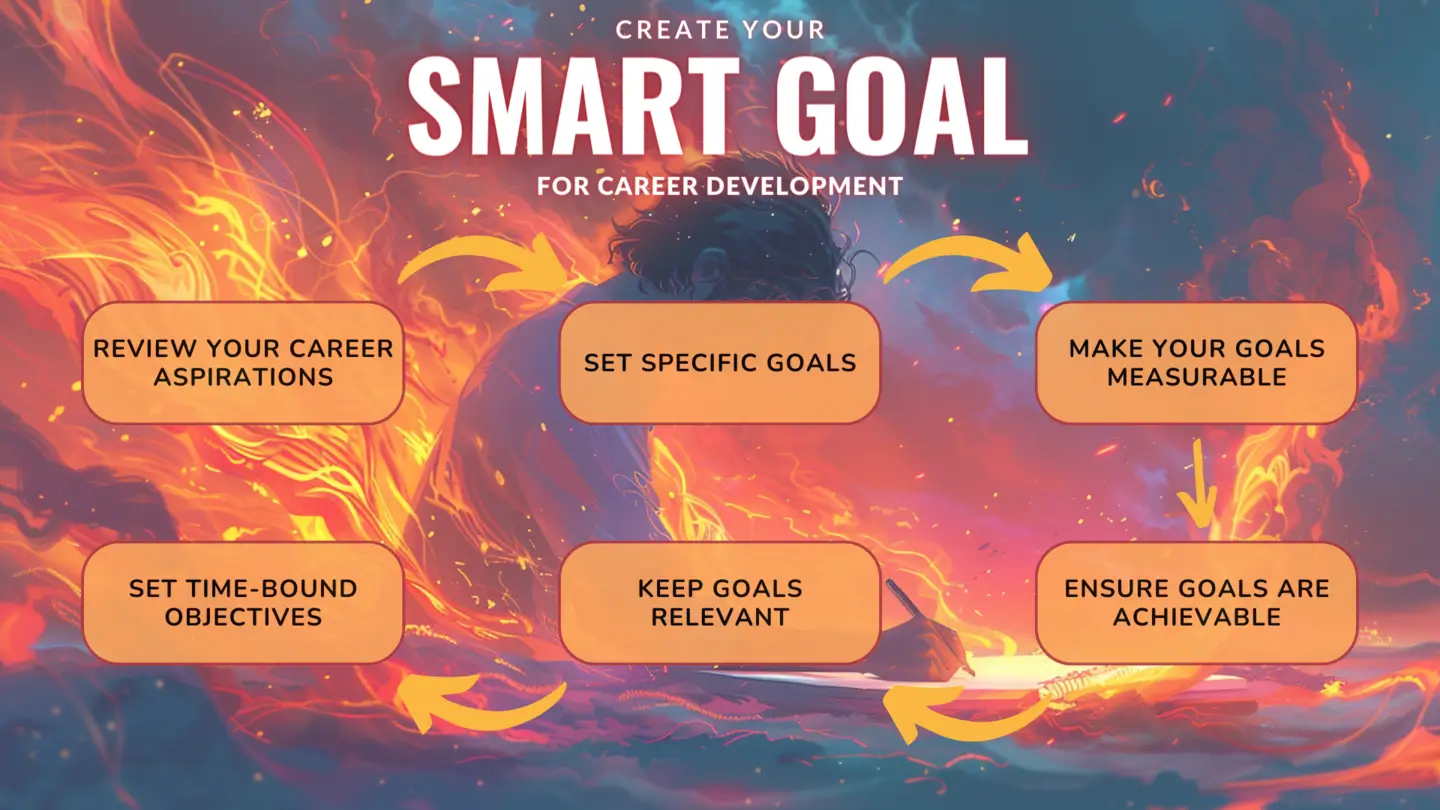You want to advance your career, but maybe you struggle with direction. Feeling overwhelmed or unsure about where to focus is common.
Haphazard goals get haphazard results! If you’re tired of spinning your wheels and want real career progress, vague aspirations won’t cut it.
Enter the SMART goal framework. SMART goals for career development provide a roadmap, turning your professional ambitions into concrete, actionable steps. It’s the system that helps you make meaningful progress towards your dream job.
"Setting goals is the first step in turning the invisible into the visible."
 Tony Robbins
Tony Robbins Basics of SMART Goals for Career Development
If the acronym ‘SMART’ leaves you scratching your head, don’t worry! It’s a simple, yet powerful framework that can transform how you set and achieve goals – especially within your career.
Think of SMART goals like a recipe for career advancement; just as a recipe breaks down a delicious dish into step-by-step instructions, SMART goals give you a clear path to reaching your professional aspirations.

What is the SMART Framework?
SMART is an acronym that helps you set goals that are actually achievable. It stands for:
- Specific: Clearly define what you want to accomplish. Instead of “get better at my job”, go for something like “learn how to use Excel pivot tables.”
- Measurable: Include a way to track progress. Aim for “increase sales by 10% this quarter” rather than just “boost sales”.
- Achievable: Goals should be challenging but realistic given your resources and skills.
- Relevant: Connect goals to your bigger career picture– why does this matter?
- Time-Bound: Set deadlines to stay on track and motivated.
VAGUE vs. SMART
- Vague: I want to get promoted.
- SMART: I want to earn a promotion to Senior Analyst within the next 18 months by consistently exceeding my sales targets and completing a project management certification.
See the difference? SMART goals provide a roadmap, making it easier to achieve what you set out to do!
TOP 5 SMART Objectives Benefits
Why should you bother with SMART goals? Here are the top reasons this framework makes achieving your career dreams significantly easier:
- Enhanced Clarity and Focus: SMART goals force you to ditch vague desires and pinpoint what exactly you want to accomplish. This clarity keeps you laser-focused on what matters.
- Trackable Progress: Measurable goals let you track your advancement. Watching yourself move closer to the finish line is incredibly motivating!
- Boosted Motivation: Breaking down goals and adding deadlines creates a sense of urgency and excitement. This helps fight procrastination and makes you more likely to stick with it.
- Greater Achievability: SMART emphasizes realistic goals. Reaching milestones offers those rewarding ‘wins’ that keep you energized for the next challenge.
- Aligned with Bigger Goals: Relevant goals ensure that each step you take serves your overall career vision, preventing efforts that waste time or lead you astray.
People following a structured action plan for their goals are 76% more likely to succeed. (Source: Michigan State University)
30 Examples of Career Development SMART Goals
Now that you understand the power of SMART goals, it’s time for some inspiration!
Below, you’ll find 30 examples to spark your own career goal-setting. Remember, these are just starting points – be sure to personalize them to fit your unique aspirations and situation.

Entry-Level Career Goals
Starting your career journey can be exciting but also filled with questions. SMART goals can give you direction and help you make the most of your early professional years.
- Secure a relevant internship: I will secure a paid summer internship in the marketing department of a tech company by submitting 10 tailored applications before April 1st.
- Expand professional network: I will attend 3 industry networking events within the next quarter and connect with at least 5 new professionals on LinkedIn each month.
- Develop in-demand skills: I will complete an online course on SQL and earn a beginner-level certification by the end of June.
- Gain presentation experience: I will volunteer to present at a team meeting at least twice within the next 6 months.
- Explore career paths: I will conduct 3 informational interviews with professionals in different fields I’m interested in by the end of the year.
"The only limit to our realization of tomorrow will be our doubts of today."
 Franklin D. Roosevelt
Franklin D. Roosevelt Mid-Career Development Goals
At the mid-point in your career, shifting your goals is essential for continued growth.
- Pursue a promotion: I will earn a promotion to Project Manager within the next 12 months by exceeding performance expectations on my current project and taking on leadership roles within my team.
- Enhance expertise: I will complete a professional certification in Agile methodologies by September to increase my value within my organization.
- Build mentorship skills: I will mentor two junior colleagues this year, sharing knowledge and providing guidance to support their development.
- Switch departments or industries: I will research and identify 3 potential roles in the data analytics field that align with my interests and skills. I’ll submit applications by the end of the year.
- Become a thought leader: I will publish 6 well-researched articles on industry trends on my LinkedIn profile over the next year to enhance my visibility and credibility.
Senior-Level Career Goals
When you’ve established yourself in your field, your goals might shift towards bigger-picture impact or entirely new ventures.
- Aim for an executive position: I will secure a Director-level position within the next 2 years by actively networking within my industry and seeking executive development opportunities.
- Lead strategic initiatives: I will propose and lead a cross-functional project to increase customer retention by 5% within the next fiscal year.
- Become a recognized expert: I will submit speaking proposals to 2 major industry conferences and deliver at least one presentation this calendar year.
- Give back through board service: I will research and join the advisory board of a non-profit organization aligned with my values by the end of the year.
- Start your own venture: I will develop a comprehensive business plan for a consulting firm in my niche and secure 3 clients within the first 6 months of launch.
"Leadership is the capacity to translate vision into reality."
 Warren Bennis
Warren Bennis Technical Skills Goals
Technical skills are vital for success in many careers.
- Master a programming language: I will become proficient in Python by completing an online course, building 3 personal projects, and passing an intermediate-level certification exam within 9 months.
- Upgrade data analysis capabilities: I will learn advanced Excel techniques, including macros and VBA, by attending a workshop and applying these skills to streamline 2 work-related reports within the next quarter.
- Enhance design skills: I will improve my graphic design abilities by completing a UI/UX course and redesigning my professional portfolio by the end of the year.
- Tackle cloud computing: I will earn an AWS Certified Cloud Practitioner certification within the next 6 months.
- Stay updated on emerging tech: I will subscribe to 2 industry-leading tech newsletters and set aside 30 minutes weekly to research and experiment with new technologies relevant to my field.

Management and Leadership Goals
Strong leadership skills are essential for driving team success and advancing your career.
- Improve communication: I will solicit feedback from my team on my communication style and implement 2 specific improvements within the next month.
- Develop conflict resolution skills: I will attend a workshop on conflict management and successfully facilitate the resolution of a team issue within the next quarter.
- Master delegation: I will delegate 20% of my current workload to team members by creating clear processes and providing regular support over the next 3 months.
- Enhance coaching abilities: I will complete a coaching skills course and provide monthly one-on-one coaching sessions to 2 team members, focusing on their individual development goals.
- Build a high-performing team: I will increase my team’s performance metrics by 10% within the next 6 months through targeted training initiatives and improved collaboration processes.
Entrepreneurial Goals
Ready to break out on your own? SMART goals can help you launch and grow your own business.
- Validate your business idea: I will conduct market research and survey 50 potential customers to assess the viability of my product/service idea within the next 2 months.
- Develop a minimum viable product (MVP): I will create a basic version of my product/service and secure 5 paying customers within 3 months of launch.
- Build a strong brand: I will develop a brand identity guide, including logo, messaging, and website, within the next 2 months.
- Grow your customer base: I will increase my email subscriber list by 500 within 6 months through targeted content marketing and social media promotion.
- Secure funding (if needed): I will develop a pitch deck and secure $50,000 in seed funding from angel investors within the next year.
"Your work is going to fill a large part of your life, and the only way to be truly satisfied is to do what you believe is great work. And the only way to do great work is to love what you do."
 Steve Jobs
Steve Jobs Steps to Create your SMART Goal
Okay, you’re excited about the benefits of SMART goals and have a bunch of ideas sparked by the examples. Now what? It’s time to turn those ideas into your own personalized career development goals!
Let’s break down a step-by-step process to make creating your SMART goals a breeze.

1. Review Your Career Aspirations
Before crafting specific goals, take a step back and examine your bigger career picture. Consider these questions:
- What excites you about your field? Pinpoint what motivates you – it could be problem-solving, creativity, helping people, etc.
- What are your long-term vision? Where do you see yourself in 5 or 10 years? (Job title, industry, owning your own business, etc.)
- What skills do you enjoy using? Are there specific tasks you find most satisfying?
SMART goals are most effective when they support your overall career direction. Taking the time for self-reflection ensures you’re setting goals that truly matter to you.
"The future belongs to those who believe in the beauty of their dreams."
 Eleanor Roosevelt
Eleanor Roosevelt 2. Set Specific Goals
Once you have a clearer picture of your aspirations, it’s time to start translating them into concrete goals. Specificity is key!
- Ditch the vagueness: Instead of “improve my writing”, aim for “write 3 compelling marketing blog posts per week”.
- Focus on the “what”: Set incremental targets to track your progress. So, instead of “become a better manager,” go for “master the art of giving constructive feedback.”
Tip: Try asking yourself “who, what, where, when, and why?” to refine your goal’s specificity.
3. Make Your Goals Measurable
Specific goals are great, but how do you know if you’re actually achieving them? This is where measurability comes in. Here’s how to ensure your goals are trackable:
- Include numbers: Aim for goals like “increase website traffic by 15%” or “secure 2 new clients this month.”
- Track your progress: Choose metrics that are easy to monitor – sales figures, project milestones, new skills learned, etc.
Measurability helps you see your progress clearly, providing motivation and allowing adjustments if needed.
"What gets measured gets managed."
 Peter Drucker
Peter Drucker 4. Ensure Goals Are Achievable
It’s important to set ambitious goals, but they should also be within reach. Here’s how to strike the right balance:
- Be realistic: Consider your current skills, resources, and time constraints. Aim for challenging but feasible goals.
- Break it down: Large goals can feel daunting. Break them into smaller, achievable steps to build momentum.
Setting overly ambitious goals can lead to discouragement. Achievable goals keep you motivated and build confidence as you progress.

5. Keep Goals Relevant
Ensure that your goals directly support your overall career ambitions. Here’s how to check for goal relevance:
- Align with your aspirations: Does this goal help you get closer to the long-term vision you outlined in step 1?
- Connect to your current role: Does this goal enhance your skills and value within your current position or industry?
Relevant goals give you focus and prevent wasted effort. They ensure each step brings you closer to your desired career path.
6. Set Time-Bound Objectives
Deadlines create a sense of urgency and help you stay on track. Here’s how to make your goals time-bound:
- Short-term deadlines: Break down larger goals into smaller milestones with deadlines in the weeks or months ahead.
- Long-term deadlines: Set a final deadline for achieving your overall goal.
Open-ended goals can easily fall to the bottom of your priority list. Time constraints motivate you to take action and prevent procrastination.
"A goal is a dream with a deadline."
 Napoleon Hill
Napoleon Hill 6 Mistakes to Avoid with SMART Goals (Real-Life Examples)
Setting SMART goals is a powerful tool, but it’s not foolproof. Even with the best intentions, some common pitfalls can derail your progress.
Let’s identify the most frequent SMART goal mistakes and learn how to prevent them from sabotaging your career advancement.
Mistake #1: Being Too Vague
Vague goals are the enemy of SMART goals. It’s easy to fall into the trap of using generic terms like “better”, “improve”, or “more”. These leave too much room for interpretation and make it difficult to measure progress.
To combat vagueness, focus on clear and specific outcomes. What exactly does achieving this goal look like? How will you know you’ve been successful?
- Vague goal: I want to be a better leader.
- SMART goal: I want to increase my team’s engagement scores by 15% within the next quarter by implementing a weekly feedback system.
"A goal without a plan is just a wish."

Mistake #2: Setting Unrealistic Expectations
While it’s important to be ambitious, setting unrealistic goals can lead to frustration and discouragement. Be honest about your current abilities, resources, and the time you can realistically dedicate to your goal.
To ensure realistic expectations, start by breaking your goal down into smaller steps. Can you achieve each of these steps with the resources available? If not, either adjust the steps or scale back your overall goal.
- Unrealistic goal: I will triple my client base within the next month without increasing my marketing budget.
- SMART goal: I will increase my client base by 10% this quarter by launching a targeted social media campaign and attending 2 networking events.
Mistake #3: Ignoring Relevance
SMART goals should directly contribute to your long-term career aspirations. If a goal doesn’t align with your overall direction, it might not be worth your time and effort.
Before pursuing a goal, ask yourself: does this bring me closer to where I want to be in my career? Will the skills and experience I gain help me reach my ultimate objectives?
- Irrelevant goal: I will master calligraphy to improve my handwriting. (Unless your career specifically involves calligraphy).
- SMART goal: I will complete a copywriting course and offer my services to 3 clients within the next 6 months to expand my marketing skill set.

Mistake #4: Neglecting Time Frames
Deadlines are essential for creating a sense of urgency and staying on track. Open-ended goals are more likely to fall by the wayside.
To combat this, attach specific dates to your goal. When do you want to achieve the overall goal, and what are the deadlines for smaller milestones along the way?
- Goal without a time frame: I want to learn graphic design.
- SMART goal: I want to complete an online graphic design course and create a new website layout for my portfolio within the next 4 months.
Mistake #5: Overlooking the Importance of Measurability
If you can’t measure your progress, how will you know if you’re on track or achieving your goal? Incorporate a way to track your advancement throughout the process.
Choose a metric that’s relevant to your goal. This could be numbers, percentages, milestones completed, or other quantifiable data.
- Non-measurable goal: I want to increase my network.
- SMART goal: I will attend 2 industry events each month and connect with at least 10 new professionals on LinkedIn.
"If you can’t measure it, you can’t improve it."
 Peter Drucker
Peter Drucker Mistake #6: Failing to Review and Adapt
Goals aren’t set in stone. Circumstances change, priorities shift, and sometimes you discover new information that requires adjustments.
Regularly review your SMART goals and assess your progress. Are you on track? Do you need to modify the smaller steps or adjust the overall timeframe? Be flexible and adapt as needed.
- Rigid goal: I will secure a promotion within the next 12 months.
- SMART goal: I will secure a promotion within the next 12 months. I will meet with my manager monthly to discuss my progress and identify opportunities to take on greater responsibility.
"The definition of insanity is doing the same thing over and over again and expecting different results."
 Albert Einstein
Albert Einstein Final Thoughts
Remember, the SMART goal framework is a tool, and like any tool, it’s most effective when used correctly.
By avoiding these common mistakes, you significantly increase your chances of setting goals that truly lead to career growth. The key is to be intentional with your goal-setting.
With self-awareness and a willingness to adapt, you’ll be well on your way to achieving your career dreams!
Next Steps
- Rework existing goals: Take one of your current goals and analyze it. Is it truly SMART? If not, rework it to incorporate the principles and avoid the mistakes we’ve discussed.
- Create a new SMART goal: Think about a specific area of your career you want to develop. Draft a brand new goal guided by the SMART framework.
- Start small: If the SMART process feels overwhelming, choose one aspect to focus on at first (making your goal measurable, for example).
"The future depends on what you do today."
 Mahatma Gandhi
Mahatma Gandhi Frequently Asked Questions
How many career goals are too many?
While there’s no single “right” number, focus is key. Aim for around 3-5 primary career goals for a given year. This allows you to dedicate enough time and attention to each without becoming overwhelmed.
Remember, you can always set more goals once you’ve made progress on your initial ones.
What should I put down for my annual goals?
Your annual goals should tie directly to your long-term career plan and your company’s overall objectives. Review your SMART career goals and identify those that can be achieved or significantly advanced within the next year.
Discuss these with your manager to ensure alignment with your role and department priorities.
How do I write a SMART career plan?
A SMART career plan starts by breaking down your long-term vision into smaller, actionable goals. Begin by reflecting on where you want to be in the next 5 or 10 years.
Then, identify specific skills, experiences, or knowledge gaps you need to bridge to reach that destination. Next, use the SMART framework to turn these needs into goals with measurable outcomes and deadlines.
What is SMART in career planning?
SMART is an acronym (Specific, Measurable, Achievable, Relevant, Time-Bound) that offers a framework for creating effective goals for your career.
It helps you move away from vague ambitions and translate your aspirations into a step-by-step plan marked by clarity and built-in measures of success.
How to use SMART goals to prepare a plan for a job or career?
Start by analyzing your current situation – your skills, experience, and interests. Next, consider where you want to go – your dream job, desired industry, etc.
Use the SMART framework to create goals that help you fill in the gaps between your current status and your goals. Those goals become the building blocks of your career plan.
What is an example of a SMART career goal?
Instead of a vague goal like “get a promotion”, a SMART goal might be: “I will secure a promotion to Senior Analyst within the next 18 months by consistently exceeding my sales targets and completing a project management certification”.
Notice how this goal is specific, measurable, achievable, relevant to the person’s current career, and has a clear timeframe.




